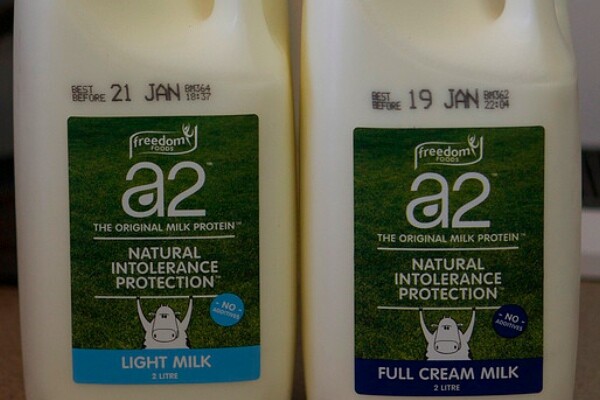What's A2 Milk and Will We All Be Drinking It Soon?

Photo:thescream/Flickr/Creative Commons License
The milk section at the grocery store is already bursting at the seams. Not only are there the various kinds of cow's milk (whole, low-fat, and fat-free) but there's also milk made from almonds, soy, rice, hemp, coconut, and probably other sources, by the time this is published. This April, a new milk will be squeezing into California: A2 milk.
A2 milk is a product from the aptly-named a2 Milk Company based out of New Zealand. Over the next three years, they will invest $20 million in order to introduce their product into the U.S. market, starting with California. They claim it's "the milk that might change everything." So, just what is it?
To understand just what A2 means, it's important to know the composition of cow's milk.
"Milk is a lot more than just water mixed up with a whole bunch of proteins," says Dr. Russell Hovey, a professor at the Department of Animal Science at UC Davis. (He also used to work at the first Australian farm that tested cows for the A2 protein.) "It actually has a lot of physical properties."
The solids found in cow's milk include proteins, fat, lactose, and minerals. One of the proteins is called beta casein, and it makes up about 30% of the protein in milk solids. But not all beta caseins are the same. Cows produce two varieties of the protein, A1 and A2, which are separated only by a single amino acid.
Since most cows produce milk that contain both A1 and A2 proteins, all of the milk sold in the U.S. (and most of the milk sold abroad), has a mixture of the two. But there are cows that are homogeneous, meaning they only produce one type of casein. The New Zealand company genetically tests all their cows to make sure they're only milking the kind that only produce the A2 variety. And, as they claim, that "natural difference in protein structure between a2 Milk?¢ and all other regular cows' milk can lead to a difference in digestive breakdown."
But, does it actually? Here's where things get murky.
A piece published last year in Mother Jones cites over 100 studies that link the more prevalent A1 milk to health conditions because of how it reacts to our bodies:
When digested, A1 beta-casein (but not the A2 variety) releases beta-casomorphin7 (BCM7), an opioid with a structure similar to that of morphine. Studies increasingly point to BCM7 as a troublemaker. Numerous recent tests, for example, have shown that blood from people with autism and schizophrenia contains higher-than-average amounts of BCM7.
However, Hovey doesn't buy it. "The jury is still out," he says. "It's too early to tell, there hasn't been enough research done."
One problem with the claims -- many of which come from studies funded by the company itself -- is that there just isn't that big of a difference between the milk. "To suggest that cow's milk is bad for people but A2 is the golden answer doesn't quite jive," says Hovey. As a result, A2 is not some miracle for those afflicted by gastrointestinal disorders that the consumption of regular cow's milk can exacerbate.
"If you have a milk allergy or lactose intolerance, this wouldn't be the right product," says Vandana Sheth, a registered dietitian nutritionist and spokesperson for the Academy of Nutrition and Dietetics.
If a person has a milk allergy, or is lactose intolerant, the slight change in which amino acid is present doesn't make a difference. They would still be allergic to milk, or react negatively to the lactose. But Sheth mentions that this new A2 milk might be good for a possible third category of people.
"Almost one in four people I meet say they have lactose intolerance," says Sheth. "But only one in 20 are actually diagnosed. So, A2 milk might be a good option for people who think they're lactose intolerant, but not officially diagnosed."
In other words, it's suitable for the group of people that don't feel completely right when drinking normal cow's milk. They may or may not be intolerant to the A1 protein, but this is worth a shot if they desperately still want to drink milk. But even if A2 milk doesn't appeal to that subsection of people, that may not affect how this new milk performs in the U.S. market, particularly in California.
"We [Californians] tend to be a society of people that are always looking for the next best thing," says Sheth. "And if you're looking at people looking for something that's not genetically-modified, this is natural. Nothing is engineered."
Hovey agrees that this new A2 milk may succeed more as a boutique offering than as a real health solution.
"It's like buying a good bottle of wine," he says. "Some people will say it's fine to pay $100 for a bottle, and some people would say 'I'm quite happy with my $5 bottle.' If consumers are prepared to pay for the product, and they find it provides them a benefit, all the best to them."